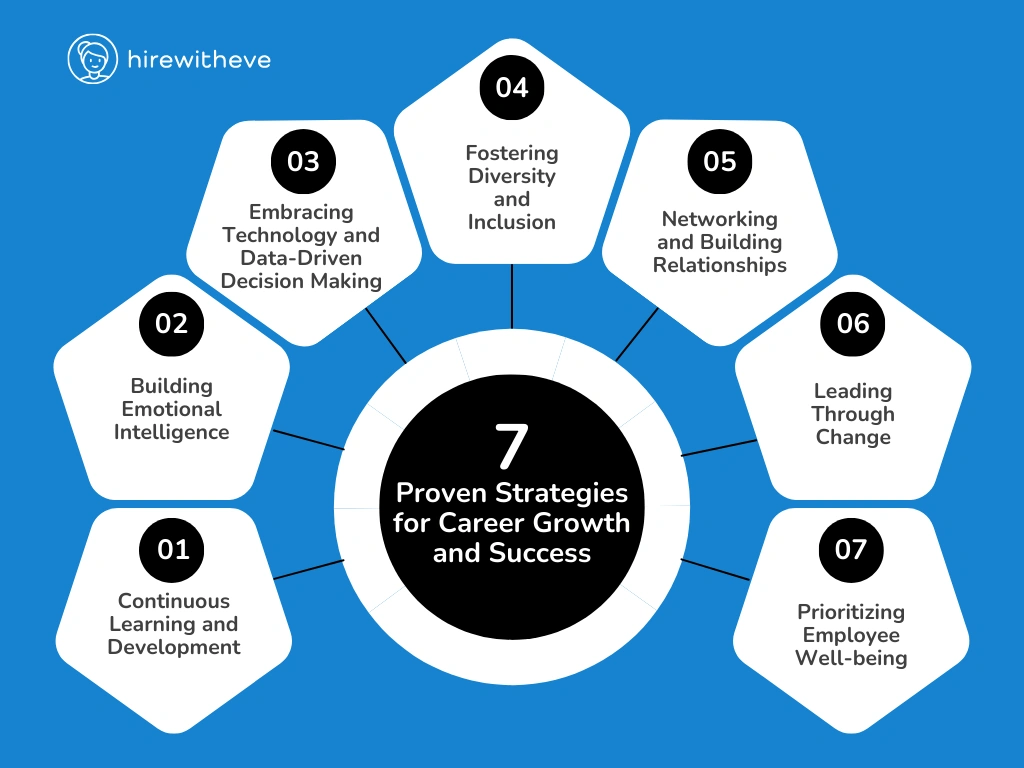HR Leadership: 7 Proven Strategies for Career Growth and Success

In today’s rapidly evolving business environment, the role of HR Leadership has never been more crucial. HR leaders are not only responsible for managing talent acquisition and employee development but also for driving organizational success through strategic people management.
The importance of HR Leadership extends beyond basic managerial functions; it encompasses the ability to inspire, lead change, and create a workplace that thrives on collaboration and innovation.
For talent acquisition specialists and HR managers looking to grow their careers, mastering HR Leadership is essential. This blog will explore 7 proven strategies for career growth and success in HR Leadership, helping you navigate the complexities of the modern workforce.
Understanding HR Leadership
HR Leadership is the capacity to influence and guide employees, managers, and the organization toward success. It involves more than just hiring and managing employees; it means leading with vision, understanding the strategic goals of the business, and aligning people strategies with organizational objectives. The key to successful HR Leadership lies in adaptability, emotional intelligence, and the ability to embrace innovation.
In the next sections, we will dive into the seven strategies that can help you enhance your HR Leadership capabilities and build a path to career success.
What are the Top 7 Proven Strategies for Career Growth and Success?

Strategy 1: Continuous Learning and Development
To excel in HR Leadership, continuous learning is essential. HR managers must stay updated on the latest trends, technologies, and regulations impacting the workforce. This includes understanding new legislation, compliance requirements, and innovations in talent management systems. Investing in your education by attending workshops, webinars, or obtaining certifications ensures that you remain competitive in the HR field.
HR Leadership thrives on adaptability, and professionals who prioritize learning are better equipped to lead their organizations through change and disruption. Pursuing professional development opportunities not only enhances your skills but also demonstrates your commitment to growth and improvement.
Strategy 2: Building Emotional Intelligence
Emotional intelligence (EQ) is a cornerstone of HR Leadership. HR professionals are often tasked with managing sensitive situations, resolving conflicts, and leading diverse teams. Developing emotional intelligence helps leaders connect with their employees, understand their needs, and foster an environment of trust and collaboration.
Incorporating emotional intelligence into your HR Leadership approach allows you to navigate interpersonal challenges effectively and promotes a healthier workplace culture. Empathy, active listening, and self-awareness are critical skills that help HR leaders build strong relationships and ensure the well-being of their teams.
Strategy 3: Embracing Technology and Data-Driven Decision Making
Modern HR Leadership relies heavily on technology and data analytics. Today’s HR professionals must harness the power of technology to improve hiring processes, employee engagement, and performance management. Leveraging data for decision-making allows HR leaders to provide insights on employee retention, diversity metrics, and overall workforce productivity.
Adopting technologies such as AI-driven recruitment platforms, applicant tracking systems, and employee management tools can significantly streamline processes. HR leaders who embrace these technologies position themselves as forward-thinking innovators capable of aligning talent strategies with business goals.
Strategy 4: Fostering Diversity and Inclusion
One of the hallmarks of effective HR Leadership is the ability to foster diversity and inclusion within the organization. Today’s workforce is diverse, with employees coming from different backgrounds, cultures, and generations. HR leaders must be proactive in creating inclusive environments where all employees feel valued and respected.
By championing diversity initiatives, HR professionals can drive innovation, enhance employee satisfaction, and improve the overall performance of their organizations. In HR Leadership, embracing inclusion is not just a moral imperative; it’s a strategic advantage that can help companies thrive in competitive markets.
Strategy 5: Networking and Building Relationships
Building strong networks is a key strategy for success in HR Leadership. By fostering relationships with other HR professionals, industry leaders, and business stakeholders, HR managers can gain insights, share knowledge, and collaborate on best practices. Networking not only opens doors to new opportunities but also provides access to valuable resources that can support career growth.
Successful HR leaders recognize that relationships are a key element of leadership, both within and outside of the organization. By nurturing professional connections, HR professionals can build a support system that aids in decision-making and career advancement.
Strategy 6: Leading Through Change
Change is a constant in the business world, and effective HR Leadership requires the ability to lead through it. Whether it’s navigating organizational restructuring, adopting new technologies, or responding to external market forces, HR professionals must be agile and adaptable.
Leading through change involves clear communication, strategic planning, and the ability to manage uncertainty. HR leaders who can guide their teams through periods of transition not only maintain organizational stability but also drive innovation and progress.
Strategy 7: Prioritizing Employee Well-being
In today’s competitive job market, employee well-being is a top priority. Effective HR Leadership involves creating a work environment that prioritizes mental health, work-life balance, and employee satisfaction. HR managers who focus on well-being initiatives can improve employee engagement, reduce turnover, and foster a more productive workforce.
Supporting employee well-being is essential for HR professionals who want to lead with empathy and compassion. Whether it’s through flexible work policies, wellness programs, or mental health resources, HR Leadership that prioritizes employee well-being can have a lasting positive impact on the organization.
Conclusion
For HR professionals aiming to strengthen their HR Leadership skills, platforms like HirewithEve.ai offer invaluable tools to support growth and career advancement. The platform’s focus on skills-based hiring helps HR leaders find the right talent quickly and efficiently, improving decision-making and streamlining the recruitment process. By providing advanced data analytics and AI-driven tools, HirewithEve.ai enables HR managers to make data-backed decisions, embrace diversity, and lead with innovation.
Additionally, HirewithEve.ai integrates with modern Applicant Tracking Systems (ATS), helping HR professionals keep track of candidates and optimize the hiring process. As you work on building your HR Leadership capabilities, leveraging these features will ensure that your talent strategies align with the evolving demands of the workforce.
By embracing the strategies outlined in this blog and utilizing cutting-edge platforms like HirewithEve.ai, HR leaders can drive career growth, lead with confidence, and achieve long-term success in the field of HR Leadership.

One thought on “HR Leadership: 7 Proven Strategies for Career Growth and Success”